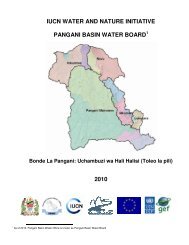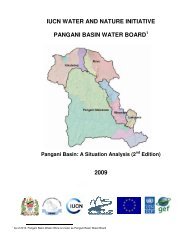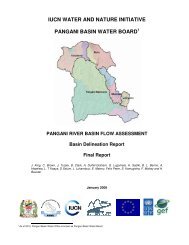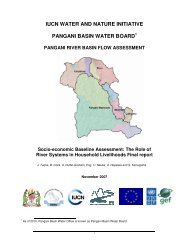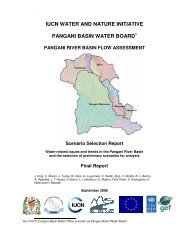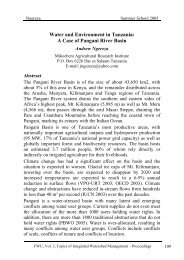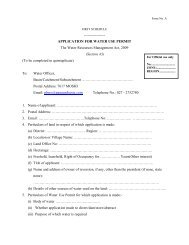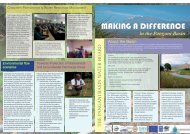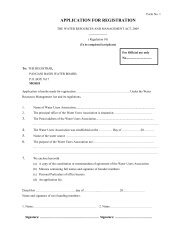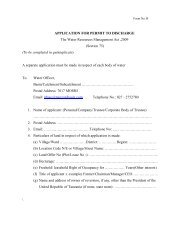Managing Conflicts Over Land and Water Resources in Pangani River
Managing Conflicts Over Land and Water Resources in Pangani River
Managing Conflicts Over Land and Water Resources in Pangani River
You also want an ePaper? Increase the reach of your titles
YUMPU automatically turns print PDFs into web optimized ePapers that Google loves.
<strong>Manag<strong>in</strong>g</strong> <strong>Conflicts</strong> <strong>Over</strong> <strong>L<strong>and</strong></strong> <strong>and</strong> <strong>Water</strong> <strong>Resources</strong> <strong>in</strong> <strong>Pangani</strong> <strong>River</strong> Bas<strong>in</strong><br />
<strong>in</strong>terview<strong>in</strong>g the above-mentioned key <strong>in</strong>formers, the researchers conducted very brief <strong>and</strong><br />
short <strong>in</strong>terviews with villagers <strong>and</strong> water users also to get the other side of the story about how<br />
government officials <strong>and</strong> NGOs’ view <strong>and</strong> underst<strong>and</strong> water use <strong>and</strong> management conflicts<br />
among villagers <strong>and</strong> other water users.<br />
4.1.3 Documentary Review of Village Records, By-laws <strong>and</strong> Court Cases<br />
The researchers also made an analysis of recorded cases <strong>and</strong> by laws utilised by the <strong>Pangani</strong><br />
Bas<strong>in</strong> <strong>Water</strong> Office, <strong>and</strong> Courts of Law <strong>in</strong> Moshi, Same <strong>and</strong> Mwanga <strong>in</strong> order to have an idea<br />
of the k<strong>in</strong>ds of cases filed, especially those related to l<strong>and</strong> <strong>and</strong> water resources <strong>and</strong> the different<br />
conflict resolution channels when decid<strong>in</strong>g on the cases applied. The researchers also wanted to<br />
explore what guidel<strong>in</strong>es are used.<br />
4.1.4 Dissem<strong>in</strong>ation <strong>and</strong> Feed-back Workshops<br />
The researchers held two workshops to dissem<strong>in</strong>ate their research f<strong>in</strong>d<strong>in</strong>gs <strong>and</strong> to get feed back<br />
from stakeholders. The first workshop was held <strong>in</strong> Moshi <strong>and</strong> <strong>in</strong>volved water bas<strong>in</strong> officials,<br />
water users, NGOs <strong>and</strong> water user associations. The second workshop was held <strong>in</strong> Same <strong>and</strong> it<br />
<strong>in</strong>volved NGOs, water users <strong>and</strong> water user associations. The ma<strong>in</strong> focus of the workshops was<br />
on issues of water rights <strong>and</strong> entitlements to volume of water, complementarities <strong>and</strong><br />
complexity of coexistence of customary <strong>and</strong> statutory ways of manag<strong>in</strong>g water <strong>and</strong> l<strong>and</strong> <strong>and</strong><br />
the way forward. As it is <strong>in</strong>dicated <strong>in</strong> appendix 4, the workshops were well attended <strong>and</strong> the<br />
comments arose from the participants helped the researchers to embellish their project report.<br />
5. Achievements<br />
5.1 Nature of conflicts<br />
<strong>Pangani</strong> Bas<strong>in</strong> has a high number of old water rights entitled to high volume of water at the<br />
time when more <strong>and</strong> more require the same source of water. High volume abstraction is written<br />
<strong>in</strong>to these old water rights. It was earlier on possible <strong>in</strong> the past to grant huge volumes of water<br />
because competitions over water were m<strong>in</strong>imal. Now with dem<strong>and</strong>s over scant water on the<br />
<strong>in</strong>crease, the high volume can no longer be assured. Need now to reduce but holders entitled to<br />
the high volume of water are reluctant. It is difficult to solve these problems us<strong>in</strong>g the current<br />
laws.<br />
5.1.1 Ma<strong>in</strong>stream<strong>in</strong>g Traditional Practices Through <strong>Water</strong> Users’ Associations<br />
<strong>Water</strong> Users’ Associations that have so far been established <strong>in</strong> Hai (1) <strong>and</strong> Moshi Rural (2).<br />
Most of the customary arrangements rema<strong>in</strong> outside the statutory framework. These<br />
arrangements <strong>in</strong>clude Mifereji ya Mila (traditional canals) have no water rights especially those<br />
from the upstream. Those from upstream have <strong>in</strong> addition no <strong>in</strong>terest <strong>in</strong> water rights.<br />
Traditional arrangements from lower stream prefer to regularize their abstractions <strong>in</strong> <strong>Water</strong><br />
Rights. <strong>Pangani</strong> Bas<strong>in</strong> officials are <strong>in</strong> agreement that statutory laws alone cannot solve the very<br />
deep social, cultural <strong>and</strong> economic problem subscrib<strong>in</strong>g traditional canals.<br />
Express<strong>in</strong>g the prevail<strong>in</strong>g view of the Bas<strong>in</strong> office, an <strong>in</strong>formant, Mr. Temu saw the only way<br />
forward is for all the canals to be registered to m<strong>in</strong>imize conflicts. This would enable all to<br />
know who gets what volume of water. There is a grow<strong>in</strong>g perception that <strong>Water</strong> Rights could<br />
be used to guard one’s right to water. Donors’ funds have ironically resulted <strong>in</strong> forc<strong>in</strong>g<br />
traditional systems <strong>in</strong>to the ma<strong>in</strong>stream. Donor funds are only directed at canals that have<br />
Draft F<strong>in</strong>al Report for ECAPAPA<br />
4



